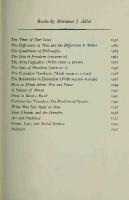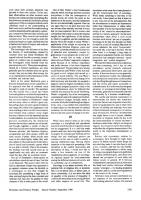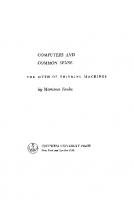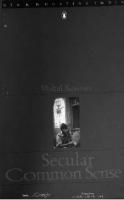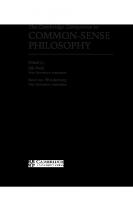The Common Sense from Heraclitus to Peirce: The Sources, Substance, and Possibilities of the Common Sense
886 72 11MB
English Pages [297] Year 1962
Recommend Papers
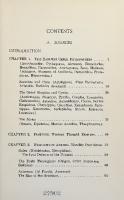
- Author / Uploaded
- Arthur N. Foxe
File loading please wait...
Citation preview
THE COMMON SENSE FROM HERACLITUS TO PEIRCE The Sources, Substance, and Possibilities of the Common Sense
by
ARTHUR N. FOXE, M. D.
TUNBRIDGE PRESS New York, N. Y.
Copyright © 1962 by ARTHUR N. FOXE, M.D. All Rights Reserved
Library of Congress Catalog Card No. 62-17387
MADE IN THE UNITED STATES OF AMERICA
TUNBRIDGE PRESS, Box 345, New York 21, N. Y.
ONULP
CONTENTS A.
SOURCES
INTRODUCTION CHAPTER 1. The Earliest Greek Philosophers. (Anaximander, Pythagoras, Alcmseon, Empedocles, Heraclitus, Parmenides, Anaxagoras, Zeno, Melissos, Leukippos, Diogenes of Apollonia, Democritus, Prota¬ goras, Hippocrates.)
1
Socrates and Plato (Aristippus). First Formations. Aristotle. Technics developed. 14 The Greek Skeptics and Cynics. 28 (Antisthenes, Diogenes, Pyrrho, Gorgias, Carneades, Cleitomachus, Arcesilas, Aenesidemus, Cicero, Sextus Empiricus, Chrysippus, Cleanthes, Xenophanes, Speusippus, Xenocrates, Asclepiades, Strato, Epicurus, Lucretius.) The Stoics . 35 (Seneca, Epictetus, Marcus Aurelius, Theophrastus). CHAPTER 2.
Plotinus. Western Thought Emerges. ... 40
CHAPTER 3.
Numenius of Apamea. Morality Over Sense. 58
Galen (Erisistratus, Herophilus). The Last Defense of the Natural. 59 The Early Theologians (Origen. Saint Augustine, Boethius) . 60 Avicenna (A1 Farabi, Averroes) The Rise of the Arabians. 63
CONTENTS — Continued CHAPTER 4. Saint Thomas Aquinas. Aristotle Revisited 67 (Albertus Magnus, St. Anselm, St. Victor, St. Bonaventure) Roger Bacon. The First Modern . 69 (Alhazen, Alkindi, Ptolemy, Euclid, Tideus) The Franciscans and William of Ockham. 77 (Grosseteste, Thomas of York, John Pecham, Richard of Middleton, Duns Scotus.) Nicole Oresme and Nicholas of Cusa. Dynamism Appears. 82 (Raymond Lull, Jean Buridan, Leonardo.) Paracelsus. Renaissance . 84
(Machiavelli, Copernicus.) Telesio and Companella. A Vision of Modernity. 84 (Jerome Cardan.) CHAPTER 5:
Science Emerges. 86
Francis Bacon. The Common Wealth. 86 (Shakespeare, Edmund Spenser) Van Helmont . 88 Harvey and Newton. 89 Herbert of Cherbury. Natural Instinct and Common Notions . 89 Descartes. Good Sense . 92 Hobbes. Substance and Understanding . 96 Gassendi. Instinct and Understanding . 98 Boyle. Local Motion the Grand Agent (Revius, Suarez, Ariaga, Hurtadus)
102
CONTENTS — Continued CHAPTER 6. The Emergence of Common Sense as a Social Sense.120 Spinoza. Substance and Mode.120 Glanvill. Childhood Disturbances Distort Sense.122 Malebranche. The Common Sense in the Brain.122 Locke. Mode, Substance, and Relation.123 Fenelon. Common Sense and Idea.124 Leibnitz. Internal Light and Childhood.124 Shaftesbury. Common Sense, Public Weal, Savoir Faire . 125 Berkeley. The General Sense of Mankind.127 Buffier. The Common Sentiment of Nature.128 Hutcheson. The Moral Sense.131 Hume. Sense, Belief, Morals, and Aesthetics.132 CHAPTER 7.
The Scottish Philosophers .134
Reid. The Common Sense Enthroned.134 Beattie. Subtleties of the Common Sense.147 Stewart. A Follower of Reid.149 Oswald. Common Sense, an Aid to Religion.160 Priestley. Dissent Against the Empire of Common Sense.152 CHAPTER 8.
Reaction
.155
Kant. Empiricism. The Return to Hume. The Well of Democritus .155 Hegel. Common Sense Dethroned. The Labour of the Notion .166 Hazlitt. The Common Sense in Place.172 Hamilton. Common Sense Common Sense.177
CONTENTS — Continued B. CHAPTER 9.
SUBSTANCE
Critical Analysis and Dialectic
Extension.173
i.
Various Views of the Common Sensibles 178
ii.
Possible Boundaries of the Common Sense .179
iii. Things in Common Sense.180 iv. Inquiry CHAPTER 10.
.180
Some Queries and Essays on Sensation
and the Common Sense .206
CHAPTER 11.
Revisionary
C. CHAPTER 12.
Notes
.241
POSSIBILITIES
Odd Notes
.247
Bibliography .270
INTRODUCTION The term common sense has two popular meanings. Here and there one may locate books that are called the common sense of house planning, the common sense of housebuilding, etc. The Cumulative Book Index for 1938-42 lists the following under Common Sense: 1— Common Sense and A.R.P. Foulkes. 2— Common Sense and Morality. 3— Common Sense and The Child. 4— Common Sense Astrology. 5— Common Sense and Bee Keeping. 6— Common Sense Child Psychology. 7— Common Sense and Christianity. 8— Common Sense Conduct and Fundamental Manners for High School Pupils. 9— Common Sense Driving and Pedestrian Rules. 10— Common Sense Etiquette Dictionary. 11— Common Sense German Course. 12— Common Sense Health Chats. 13— Common Sense. How to Exercise It. 14— Common Sense in Chess. 15— Common Sense in Epistemology. 16— Common Sense in Etiquette. 17— Common Sense in Home Decoration. 18— Common Sense in Idealism. 19— Common Sense in Management. 20— Common Sense in Religion. 21— Common Sense in the Rock Garden. 22— Common Sense Method of Practical Linguistry. 23— Common Sense Neutrality. 24— Common Sense of Christianity. 25— Common Sense of Music. vii
26— Common Sense Plus. 27— Common Sense of Speculation. 28— Common Sense Thrift and Conservative Investments for High School Pupils. Such books do not treat of any sense in an anatomic way, but refer to simplifications separated from all complexity. Another popular usage is one in connection with human beings. Thus an individual may become exasperated at the behaviour of a friend, especially if the behaviour was not well thought out or was care¬ less. He may say, “Why don’t you use your common sense?” or “Common sense will tell you that this is the way it should be done.” In both the above examples it is implied that a great deal of thinking or planning is not necessary to achieve a result. In both instances it seems that it is not the action but a perceptive quality that is stressed verbally, whereas actually it is the nature of an action that produces the criticism. The concepts of percep¬ tion and action are so closely involved in these instances as to defy distinction upon first examination. To ‘use’ one’s common sense is another inversion of action and sense. “Common sense will tell you” anthropomorphizes common sense into a speaking voice. In these uses of the word common sense, it seems to be indicated that there is a field of knowledge which everyone possesses and in connection with which, action should be rela¬ tively simple. An elaborate example of this is Thomas Paine’s “Common Sense” which is fundamentally a call to action. One might ask whether Paine is using a common sense or appealing to the common sense of people. It is not possible to believe that he meant to be fraudulent in his title. Apparently he does not feel that his common sense is the best technical instrument, for in his introductory note to the Age of Reason, he writes, “The most formidable weapon against errors of every kind is reason. I have never used any other, and I trust I never shall.” One might ask why he ever appealed to the judgment of common sense. Perhaps he himself is mistaken and used both common sense and reason. It is surprising that everyday usage of what applies to the everyday man in the everyday world should not be so simple vm
to grasp or define on objective study. Is the term “Common Sense” merely a convenience of speech to describe something not necessarily connected with a sense in the usual usage of that word? Or is there actually a sense which may be called a com¬ mon sense and is it like the other senses such as smell, taste, touch, hearing, vision, balancing sense, etc? If there is such a sense it certainly has been neglected in both scientific and nonscientific study. If it is not a sense it certainly merits study, for a turn to what is called common sense is a frequent and every¬ day occurrence. Even here scientific and non-scientific studies are lacking. What is common sense? What are its qualities? What are its parts? What relation does it bear to the organism itself and then what is its relationship to the external world? What is its function and degree of usefulness? Is it merely the well of everyday useful knowledge? Then why is it called the common sense? Webster defines common sensation—Psychological—(a) coenaesthesis; (b) sensations such as pressure, which are com¬ mon to more than one sense organ. It defines common sense— (a) A sense supposed to unite the sensations of all the senses in a general sensation or perception-obsolete or historical, (b) Good, sound, ordinary sense; horse sense; normal intelligence, (c) Philosophical—(1) With the Scottish, the intuitions which are common to all mankind. (2) The unreflective opinions of ordinary men; the ideas and conceptions natural to a man un¬ trained in dialectic;—used especially in epistemological discus¬ sions. It defines the common sensory—the seat of the common sense. In these definitions we are directed to the realms of philos¬ ophy, the older psychologists, and thirdly to the judgments of everyday life with which this discussion was opened. Whether there are sensations peculiarly common to all sense organs or more than one sense organ is not as yet proven scientifically. That sensations of various sense organs contribute to form the matter of perception is undisputed, but exactly how or where this is done and whether there is a special sense for this also is not yet verified scientifically. As for “unreflective opinions of ordinary men,” this is the very problem which requires study and IX
which here is brought to the fore. What is this “horse sense?” One may ask a number of fundamental questions: 1.
Is the common sense merely the perception of a store of knowl¬ edge common to all or most men? 2. Is it a sense or are the problems of common sense merely the problems of perception in general? 3. Is it a ‘lower’ form of sensibility-phylogenetically, psycholog¬ ically, or intellectually? Or is it the ‘usual’ form of sensibility? 4. What are its connections with thought, reflection, the forms of sensation, decision and action? 5. May it be examined scientifically?
THE COMMON SENSE FROM HERACLITUS TO PEIRCE
A. Sources CHAPTER I
The Earliest Greek Philosophers There is very little on our subject prior to Plato and Aristotle but one may examine what there is. It seems that the idea of a material substance first began to be discerned around the time of Anaximander (fl. 565 B.C). The concept of things (as num¬ bers) seems defined with Pythagorus (fl. 532 B.C.). The idea of a ‘mean’ or ‘attunement’ might be considered a suggestion of the ‘common’; however there is no evidence that Pythagorus held any such idea kindred to what is called common sense. Alcmaeon of Croton (fl. 515 B.C.) was a physician, the first great physician of theory, and apparently the first neurologist and psychiatrist. His influence was very large and significant. He is said to have performed dissections. He originated the doctrine of pores (important in connection with atomic theory). He was the first of the Greeks to distinguish between the sense and the intellect. He believed that the ‘point of sense’ was the brain or in the brain. (Aristotle later believed it to be in or around the heart). He believed that sensation was due to an interaction of dissimilars. Health to him was a balance of oppo¬ sites. This relation of dissimilars and opposites later was quite influential with Empedocles in the development that led to Hip¬ pocratic medicine from the prior, limited, purely empirical techniques of religious and Homeric medicine. Beare says that a ‘synthetic activity’ is implied in the discoveries of Alcmaeon. Heraclitus’ (fl. 504 or 490 B.C.) teachings are said to be 1
summed up in the rule, “Follow the common.” However, Burnet and other writers stress that this is very different from com¬ mon sense. Burnet says, “The ‘common’ upon which Heraclitus insists is nevertheless, something very different from common sense, for which indeed he had the greatest possible contempt.” He says that Heraclitus objects to the ‘many’ (that is the many individual opinions) as opposed to the one Wisdom which is “Common.” Burnet thus stresses the difference between the various funds of common knowledge and wisdom but he does not explain Heraclitus’ use of the word “Common.” Heraclitus compares the ‘common’ to the laws of a city which are imperfect embodiments of the divine law. Heraclitus felt only the excep¬ tional individual had the ‘common’ embodied in him. It is important, it would seem, to recognize in the work of Heraclitus, at least a sense of the common if not a common sense. This sense of the common with Alcmaeon’s discovery of sense as separate, might be significant for Aristotle, later, in the development of the concept of a common sense. Heraclitus’ sense of the common may also be responsible, in part, for Plato’s view (in the Republic) that the leader must enter among the people if he is to be a good leader. Heraclitus valued the senses, “The things that can be seen, heard and learnt, these I honour especially,” although he stresses correct interpretation of sensory data, “Bad witnesses are the eyes and ears to men, if they have souls (for understanding and wisdom) that understand not their language.” He says, “War is common to all.” “Thought is common to all.” “Therefore one must follow the common, but though the Word is common, the many live as though they had a wisdom of their own.” “The waking have one common world, but the sleeping turn aside each into a world of his own.” It would seem that Heraclitus is using common in the sense of something that is superior to the individual and which is common to all people and most distinctly appearing in certain superior individuals—perhaps a common interest or natural law among them which must not be neglected. Exactly what this Word is and who is to decide what the Word is he does not describe and there his scientific value diminshes. Sextus Empiri2
cus feels Heraclitus meant common divine reason, and “follow the common” is said to mean “follow the comprehensive (£,uvo- Place is a double relation (6, 1, 24). Situation (state) is also a relation (6, 1, 14). “The relatives might be divided according to the scheme of the ancient philosophers, by saying that some of them are efficient causes, while others are measures, that the former distinguish themselves by their resemblances and differences, while the latter consist in excess or lack” (6, 3, 44
28). “Time, being the measure of movement, re-enters into relation.” “Place, being that which contains the body, consists of a manner of being, and consequently, is a relation” (6, 3, 11). “For things were not to depend on each other, but to have rela¬ tions founded on their resemblance. This no doubt is that which is meant by the expression that, ‘analogy embraces everything’ (3, 3, 6). Naked and clothed are relatives (not qualities) (6, 3,
20).
Quality. Quality is the ‘suchness.’ It exerts a power to decide the phenomena of objects. Quality consists in (unessential) powers (such as habituation and disposition). Thus boxing ability is a quality. “A quality is therefore a power which adds (essential) characteristics to already existing beings.” “These characteristics which differentiate beings can therefore be called qualities only figuratively.” “Qualities are rather actualizations and reasons, or parts of reasons, which produce the ‘whatness,’ though the latter seem to qualify the being.” Deserving “qualities, ‘potentialities,’ they are the reasons and shapes, either of the soul or the body, such as beauty or ugliness.” “In general, quality should not be made to consist in power, but rather in the disposi¬ tion, and to consider it as a kind of form of character. Thus the common element in all qualities is found to be in this form, this classification, which is no doubt inherent in being, but which certainly is derivative from it.” “In general, quality consists in a non-essential characteristic.” It gives something to beings as far as it constitutes something distinct therefrom and is actuali¬ zation of being as an image or adumbration (6, 1, 10). Shape is not a quality but a specific appearance or reason. Permanence is only an accident (6, 1, 11). Qualities are useful or harmful. Boxing and the arts as far as they give a disposition to the soul are qualities, but as far as they act and refer to something else they are relatives. Activity is activity only because it is a quality; activity does not alter quality. As the plurality is to quantity so the characteristic is to quality (6, 1, 12). In the intelligible world there is quality whereas in being and essence there are characteristic differences. “These differences effect distinction between beings; in short they cause them to be beings.” In the sense world qualities are differences of being such as quadruped and biped. Others are not differences and on 45
that very account are called qualities. Essential quality is a peculiarity of being (such as white lead). Mere quality affects classification (such as white swan, for all swans are not white). One must distinguish difference of being (as in quadruped and biped), complement of being (as whiteness in a swan), accident of being (as whiteness in a human), quality (on the surface of a being). “What constitutes a whatness or quiddity (the Aris¬ totelian ‘what were it to be’) in the intelligible world, becomes a quality in the sense world.” Things which arrest one’s gaze are not quiddities but qualities of sense; they are not really being but an affection of being (2, 6, 1). Quality is something outside being, “something which adds to being something which is not necessary as virtues and vices, ugliness and beauty, health and individual resemblance.” The triangle is not a quality, but triangular formation or appearance is a quality. It is the same in the arts and professions. “Conse¬ quently quality is a disposition, either adventitious or original, in already existing beings” (2, 6, 2). Qualities are properties, differentia, or particular characters in connection with the self. Quality is the superficial part of being. In the sense world quality is not a form but a trace or adumbration. Qualities are only ac¬ cidents and only reveal shapes of being; they are habituations and dispositions which are not essential to substances and con¬ stitute a form of being (2, 6, 3). Number is symbolized by one, quality by two, and greatness by three. Quality and quantity combined give figure or outward appearance (6, 2, 21). Sense¬ being is formed by the reunion of quality and matter (6, 3, 8). Not whatness but suchness, ‘this kind,’ expresses quality. “Thus the arts which relate to the body, which make use of the organs, and which consult the senses are really dispositions of the Soul, but only of the Soul as applied to corporeal objects; and con¬ sequently they should be classified among the sense-qualities.” Also included would be the practical virtues as civic duties, facul¬ ties, sciences, and experience. Qualities are corporeal and of the soul (6, 3, 16). “It is by quality that we distinguish the differences which inhere in being, as well as the actualizations, the beautiful or ugly actions, and in general, all that is particular. Only very rarely do we discover in quantity differences which constitute 46
species; so much is this the case, that it is generally divided by its characteristic qualities” (6, 3, 17). Objects should be classified according to their effects or salient characteristics and if this cannot be done one may distinguish as dark from light green. Habits (as sweet) and differences of habits (as virtue and vice) differentiate things and are qualities. Some differences are not qualities as vice referring to pleasure. Privation (as toothless) is a quality. The adverb ‘well’ is a quality. Having blushed is a quality but blushing is an experience and not a quality. Habits as being warm or sick are qualities whereas warming up or becoming sick are not qualities (6, 3, 18). Quality admits of degrees (6, 3, 20). Matter has no quality (1, 8, 10). Movement. Plotinus takes Aristotle to task for not making movement a genus of being, but this is easy to do if one neglects to examine the fact that Aristotle does make movement an im¬ portant category under the common sense (6, 1, 16). Plotinus says that Aristotle could have subsumed action and reaction under movement (6, 1,18). Aristotle’s approach to the categories is a little different from Plotinus’ approach to the sensecategories. Certainly the space which Aristotle gives to move¬ ment in the Physics indicates he felt it to be a very significant matter. In a curious paragraph Plotinus does not speak against any common sense but does speak of ‘something’ in ‘common.’ “The doctrine raises a number of objections in that it attributes to all beings something in common, and thus embraces them in a single class. Indeed, this ‘something’ of which they speak is quite incomprehensible.” In this, Plotinus levels off, not against Aris¬ totle, but against the Stoics to whom he is generally harsh and in an emotional tone (6, 1, 25). “Now the movement proper to the body is to mobilize in a straight line; the movement proper to the soul is to contain; while both of these movements result in a third, the circular which includes both transportation and permanence” (2, 2, 1). As in Plato, the movement of the soul from one object to another gives rise to number (6, 6, 4). Actualization rather than action is a category (6, 1, 15). There is succession in move¬ ment (6, 1, 16). “Sensation relating to something else, has a relation with that thing; but besides that relation it has the 47
property of being an ‘action’ or an ‘experience’ ” (see under relation.)” “Thus there are two manners of acting; to act within oneself and to act outside of oneself.” Therefore action and re¬ action form one genus (6, 1, 19). “We shall therefore define action as a spontaneous movement, whether this movement re¬ main in the being who produces it, or whether it pass into some¬ body else” (6, 1, 21). “The cause that a being undergoes an experience is that it contains the kind of movement called alteration, whichever way it modify him; on the contrary, action means to have in oneself a definite movement, derived from one¬ self, or a movement which has its goal in some other being, and its origin in self.” Action is impassible whereas experiencing involves the reception of a new disposition (6, 1, 22). Movement is life’s actualization (6, 2, 7). “We must not add the conception of the present to that of movement” (6, 3, 19). “Movement is the passage of potentiality to the actualization of which it is the potentiality” (6, 3, 21). “The common element (in movement) is that the moved thing, after the movement, is no longer in the former state; that it no longer remains quiet, and does not rest so long as the movement lasts.” Otherness is ceaseless alteration (6, 3, 22). Stability is characteristic of the intelligible world whereas stillness is in the sense world; stillness really is only a slower movement (6, 3, 27). Life in the sense world is mobile (3, 2, 4). “Action implies some sort of difference, otherwise, to what would action apply itself (4, 3, 10) ?” Time. It has been noted that Plotinus indicates that when time acts as the measure of movement, it ‘re-enters into relation.’ If time measures it exists in what measures and it then is ‘the soul, or present instant.’ If it exists in what is measured it is a quantity as far as it has a quantity. However, “so far as it is time, it has another nature” (6, 1, 5). Plotinus feels that if it is a quantity there is no need for making it a separate category (6, 1, 13). He indicates that to the Aristotelians, the life of each being is accomplished in a perfect time (6, 1, 19). Plotinus treats time, for the most part separately and in connection with eternity rather than among the sense categories. “Eternity im¬ plies identity, and time implies diversity.” “The soul is not within time but only its actions and reactions are.” “What is in time is less than time. And following Plato, “Time embraces 48
all that is number and place” (4, 4, 15). “Time is conceiving things in a successive manner.” “The universal soul embraces things simultaneously.” This is because we “successively need various things” and outside things offer themselves to us suc¬ cessively (4, 4, 17). “Time is not a quantity” (Aristotle said time is the number of movement) (6, 1, 5). Movement has no need of time. Move¬ ment only needs time to become an action (6, 1, 16). In connec¬ tion with physical being, he says, “So space is that which limits, and time that which measures something else” (6, 3, 4). Plotinus distinguishes eternity (a light radiating from intelligible exis¬ tence in which there is only a present) and that which is in time. As for ‘begotten’ things—inasmuch as their existence “consists in perpetually acquiring (something or another), they will be annihilated by a removal of their future” (3, 7, 2). Plotinus opposes a fundamental union of time and movement, for move¬ ment can cease and stop and time never does (3, 7, 6). There is a difference between time and some particular time. And here Plotinus practically grants what he previously had taken away, for he says, “We may grant that time is the number which measures movement, while remaining exterior thereto, as ‘ten’ is in ‘ten horses’ without being conceived with them” (3, 7, 8). Time exists prior to measure, however. “Before priority and posteriority, time, which did not yet exist, brooded within exis¬ tence itself.” Time appeared at the same time as motion. “We achieve a representation of the time that is the image of eternity, by the length that we must go through with to reach what fol¬ lows, and is posterior, towards one moment, and then towards another.” Time arises as a process and not a ‘fiat.’ The life of the soul is varied “and from the variety of her life results the variety of time.” “The extension of the life of the soul produces time.” “We may therefore properly define time as the life of the soul considered in the movement by which she passes from one actualization to another.” “Time is within the soul” (3, 7,10). “Since time is annihilated as soon as the soul ceases to act, and concentrates in unity, time must be produced by the beginning of the soul’s motion toward sense-objects, by the soul’s life.” Time itself is not a measure. The expression ‘to measure time’ is ‘premeditated.’ Actually, “The movement of the universe is 49
measured according to time” but this too is only accidental be¬ cause it is different from movement. Movement as a measure may be used to ‘indicate’ time (3, 7, 11). Time is that within which all things become and grow. To Plato time was the mobile image of eternity. The movement of the soul gives priority and poster¬ iority which is succession through actualization (3, 7, 12). The Stoic Categories. Plotinus then examines the four Stoic categories of Substance (substrate, matter), Quality, Mode, and Relation (6, 1, 25). He makes short shrift of them. Yet one must feel that his ability to subsume so many factors under relation has a Stoic influence (2, 4, 1). He is ‘shocked’ that the Stoics place matter first whereas he would place it last (6, 1, 26). He says, “The cause of their error is that they have chosen sensation as their guide, and have consulted nothing else in determining both their principles and consequences.” He seems to become emotional and sarcastic when he says, “The most surprising thing, however, is that the (Stoics), in all things following the testimony of sensation, should not also have affirmed that essence can be perceived by sensation.” Plotinus felt that sensation could grasp the forms of sense objects but only roughly even in that (6, 1, 28). The Categories of Plotinus. Plotinus considers the five pri¬ mary genera (or categories) to be Being (essence), Movement, Stability, Identity, and Difference. However, he does not believe that these are applicable as such to the sense world. As he ap¬ proaches an examination of sensible things he becomes more and more vague and lacks precision (6, 2, 7). The clearest he is in the corporeal categories is in the series matter, form, com¬ bination, relation, quantity, quality, and movement. “Otherwise, the latter three might be subsumed under relation, which posses¬ ses more extension than they.” Yet his examinations of actualiza¬ tion, form, and combination show some sharp insight (6, 3, 3). He distinguishes between unity and the unitary (6, 2, 10). He indicates that there are more ways than one to classify bodies and finally says, “When analyzing sense-being, it is not unreason¬ able to classify it according to the differences that appear to the senses. This (‘being’) does not possess absolute (essence) ; it is the totality of the matter and qualities which constitutes the sense-being, since we have said that its hypostatic existence con50
sists in the union of the things perceived by the senses, and that it is according to the testimony of their senses that men believe in the existence of things” (6, 3, 10). Thus in examining the categories, Plotinus, by the stress he places upon them, seems to arrive at an emphasis on Quantity, Relation, Quality, Movement, and Time. Now apart from the stress on Relation (which seems more original with the Stoics than with Plotinus) these few categories, oddly enough seem very approximate to Aristotle’s Common Sensibles, which latter Plotinus does not mention at all. None the less, Plotinus in his own formation of categories, really feels he departs from the world of sense-being which is not very helpful in a study of sensation. It would have been nice had Aristotle given as much time to a detailed study of sensation as he gave to Physics and had Plotinus examined sensation more closely instead of urging it to fit so closely with his metaphysics. But then this is idle wishing of those who contributed so much, Plotinus notably for some brilliant insights as well as some elaboration of the views of Aristotle and Plato. Perceiving One Perceives. Naturally, Plotinus will not in¬ clude any such activity under the common sense, but Plotinus’ stature makes us examine what he says of such a function or activity; or at least of consciousness of self if not of perceiving alone. The individual “possesses sensation only at the price of suffering.” Thus to Plotinus the self-preservative value of sensa¬ tion has lesser value and perhaps some of the suffering (also seeming to mean passivity, receiving) was related (as in the Stoics) to the denial of sensory values (4, 9, 3). Yet there is a suggestion of a contradictory element when he says, “The princi¬ pal of pain is latent in the soul” (3, 6, 3). In this connection there is a passage that must be brought in, largely because of a word. Plotinus says, “—but there are also affections which belong exclusively to the soul, because the soul is a real being, with characteristic nature and activities. In this case, the soul must have desires, and recall them, remember¬ ing that they have, or have not been satisfied; because, by her nature, she does not form part of the things which are in a per¬ petual flow. Otherwise we could not attribute to the soul co51
enesthesia (common feeling), conscience, reflection, or the intui¬ tion of herself” (4, 3, 26). Now Plotinus does not imply sensation in this function but something he would consider well above sensation. Then how explain the word coenesthesia (Guthrie’s translation) which in literal translation is the Greek for common sense? If one examines the Greek text one finds it is the word synaesthesis (aovoda0r]aiq) and not the term common sense or coenesthesia (koivt) aiaBrjaiq). Now the word synaesthesis has come to mean, in English translation, a sensation or feeling pro¬ duced in one part of the body by a stimulation at another part, or else concomitant (unsynthesized) sensation, as when sounds produce sensations of colour; while oddly enough, the word coenesthesia, which literally translated means common sensation or common sense, has lost this meaning except in an exceedingly rough and undifferentiated way, notably the undifferentiated complex of organic sensation forming the essence of our sense of body and bodily condition; the general mass of sensation as distinguished from specific sensations. As Bouillet shows, Plo¬ tinus uses the four words synaesthesia, conscience, reflection and intuition synonymously and interchangeably at one place. It is interesting to give a tabular use of the words by different trans¬ lators. Guthrie translates the word as common feeling. None of these translators uses the terms common sense, sensus communis, or sens commune. The Greek word aesthesis, in Greek, has broad meaning. To proceed with Plotinus’ views on self consciousness, he says, “The advantages derived from this conversion towards the divinity are first, self consciousness, as long as he remains distinct from the divinity” (5, 8, 11). Plotinus thus arrives at a concept of consciousness of self by introspection (Aristotle derives it from sensation and scientific examination—at least in its purely sensory form). He indicates and recognizes that ordin¬ arily one is not conscious of self while acting or, for example, reading. Consciousness weakens the energy of any deed (5, 8,11). Here it becomes apparent that as a result of the phenomenon of self-consciousness, Plotinus arrives at a conception of atten¬ tion as well, for souls “are obliged to occupy themselves with a body which demands sustained attention” (4, 3, 4). Plotinus seems to connect education and attention, “From 52
cis
§ OS a N D W
2CS Wnj ’43 P
S
3
§-§
to s
o CJ
O
P P (D
» co Jh *£ O
CO
O
G
